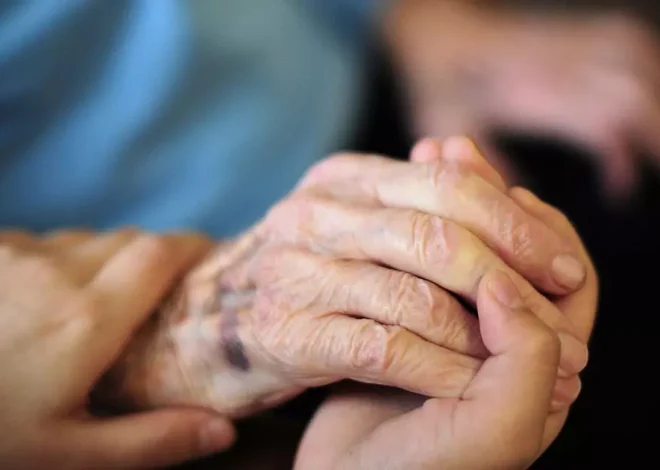
Care product scam: Insurance companies warn of care fraud

People in need of care are entitled to nursing aids (e.g. disposable gloves and disinfectant gel) up to 40 euros per month.
Some companies use this entitlement to provide people in need of care with a monthly box of care products, for which they charge up to 40 euros to the health insurance companies.
But the boxes are often a nuisance for those in need of care, as Business Insider learned from insurance circles. In addition, in some cases the boxes are even a scam, warns the DAK.
There are five million people in Germany who need care. A full 80 percent of them are cared for at home, often by relatives. Anyone who has someone in need of care in their immediate family knows how emotionally and physically stressful this can be.
To make the task easier, caring relatives in Germany are entitled to financial support. In addition to the care allowance, they can also receive free care products, such as face masks or disinfectants. According to Section 40 of the 11th Social Code, insurance companies must provide people in need of care with up to 40 euros per month for care products. That’s up to 480 euros per year – a business potential that some companies do not leave unused.
There are a number of companies on the Internet that advertise free care product boxes. The companies offer to send people in need of care a monthly box of care products (often disinfectant gel, gloves and face masks) and in return they can bill the insurance companies directly for 40 euros. But the contents of the boxes are often only worth a fraction of the money paid – and in some cases, according to health insurance companies, there is even a scam behind it.
DAK reports nursing fraud on the telephone
Business Insider learned from insurance circles that there are apparently repeated problems with the care product boxes. Sometimes, people in need of care are called by call center employees who try to persuade them to opt for a free care product box. The often elderly people are overwhelmed by the situation, insiders report. In some cases, contracts are also foisted on people in need of care.
They would then be buried in packages containing hundreds of face masks and liters of disinfectant gel – while the companies collect money from the insurance companies every month. But there is apparently an even more perfidious scam that the German Employees’ Health Insurance Fund (DAK) is warning about.
“We can confirm that DAK-Gesundheit also receives feedback from insured persons or relatives about care product fraud,” explains a DAK spokeswoman when asked. The people affected are often not aware that they have applied for something on the provider’s website, the spokeswoman continued.
“Our affected insured persons report that they were then contacted by telephone.” The callers already had personal information that the people in need of care had entered on the website. “The purpose of the phone call is to urge the insured persons to conclude further contracts for nursing aids, home emergency call systems or bed protection pads,” the spokeswoman explains.. “The specific needs of those in need of care … are irrelevant.”
The providers would then subsequently submit applications to DAK on behalf of the person in need of care for additional care products. “We advise our insured persons not to give any information about their health or nursing insurance over the phone.” However, DAK does not say which companies are involved.
The AOK Federal Association also says that there have been reports of people in need of care who were tricked into subscribing to a care product box over the phone against their will. In an online announcement in March, the AOK Saxony-Anhalt warned of a similar care scam.
People in need of care pressured to sign at their front door, says TK
The Techniker Krankenkasse (TK) has also had negative experiences with the care product boxes. “Unfortunately, as far as we know, some dubious providers are trying to use various methods to bill the 40 euros by offering insured people care aids that they don’t actually need,” a spokeswoman explained when asked. Some companies are extremely aggressive in their approach.
“Insured persons are approached at the front door and pressured to sign, or they are called and questioned,” the spokeswoman reports. “With the data obtained and a possibly forged signature, these providers then try to settle accounts with the nursing care insurance company.” TK does not name any specific providers either, but says that it is working with the investigative authorities and other health insurance companies.
It is not possible to quantify the extent of the damage to insurance companies due to unfair care product box subscriptions. The DAK reports that it spent over 164 million euros on care products and technology in 2022, but the care product boxes were not recorded separately. The umbrella association of statutory health insurance companies is also unable to quantify the total costs for such boxes: “The umbrella association of statutory health insurance companies does not have its own data on this,” they replied to a request from Business Insider.
The contents of the box are often only worth a few euros
Due to the current regulations, the care product boxes are almost always made up of the same things: There is disinfectant gel, face masks and disposable gloves. Sometimes there are also protective aprons and finger cots. The market price for the contents of the box is often well under ten euros. So are the companies using the existing regulations to get the health insurance companies to pay for the care products at an enormously inflated price? “That cannot be ruled out,” the Federal Association of General Local Health Insurance Funds (AOK) replied to our inquiry.
Even if those in need of care do not directly cover the costs of the care product box themselves, they pay for the boxes indirectly through their insurance contributions. Care expert Daniela Hubloher from the Hessen Consumer Advice Center even sees the boxes as “a huge waste” at the expense of the contributors. The question arises: what could the insurance companies do about it?
“If a box contains the products listed in the nursing aid directory, it is suitable per se,” explains a spokesperson for Barmer. “Ultimately, however, the individual benefit depends on the exact contents of the box, the respective care situation and therefore the respective need.” However, the company does not comment on the boxes of individual providers.
Read also

Ethel Purdy – Medical Blogger & Pharmacist
Bridging the world of wellness and science, Ethel Purdy is a professional voice in healthcare with a passion for sharing knowledge. At 36, she stands at the confluence of medical expertise and the written word, holding a pharmacy degree acquired under the rigorous education systems of Germany and Estonia.
Her pursuit of medicine was fueled by a desire to understand the intricacies of human health and to contribute to the community’s understanding of it. Transitioning seamlessly into the realm of blogging, Ethel has found a platform to demystify complex medical concepts for the everyday reader.
Ethel’s commitment to the world of medicine extends beyond her professional life into a personal commitment to health and wellness. Her hobbies reflect this dedication, often involving research on the latest medical advances, participating in wellness communities, and exploring the vast and varied dimensions of health.
Join Ethel as she distills her pharmaceutical knowledge into accessible wisdom, fostering an environment where science meets lifestyle and everyone is invited to learn. Whether you’re looking for insights into the latest health trends or trustworthy medical advice, Ethel’s blog is your gateway to the nexus of healthcare and daily living.




